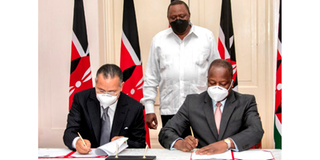Premium
Kenya signs telemedicine partnership with Italian hospital

President Uhuru Kenyatta oversees the signing of an MoU by GSD vice president Kamel Ghribi (left) and Health Cabinet Secretary Mutahi Kagwe.
Kenya’s prowess in telemedicine in Africa is gaining momentum during the pandemic period, with more partnerships with global players being witnessed.
The latest in a country seen as the most potential e-health market in the continent is an agreement the Kenyan government has signed with Italy’s largest private hospital group Gruppo San Donato (GSD) and Italian medical varsity Vita -Salute San Raffaele University.
The collaboration targets to enhance the access of medical care, diagnosis and treatment through telemedicine platforms and the construction of modern hospitals.
In the presence of the Italian Ambassador to Kenya, Alberto Pieri, a Memorandum of Understanding was signed between GSD, represented by its vice president Kamel Ghribi, Prof Gianvito Martino, the Vice Rector for Research at the Vita -Salute San Raffaele University and the Kenyan government, represented Health Cabinet Secretary Mutahi Kagwe.
The MoU relates to a partnership between the Italian hospital, the Vita - Salute San Raffaele University and the Kenyan Ministry of Health to provide an enhanced local e-health sector.
Regional health hubs
Mr Ghribi said Africa’s universal health care requires regional health hubs which in turn can become key geo strategic health centers on the continent.
“To achieve this, we need to have stronger networks of health cooperation. The agreement between Italy and Kenya is a sign of long-term engagement for a better future and healthcare for all,” he said.
With a long-term vision to guarantee universal healthcare in Kenya, the partnership aims to ultimately provide improved assistance and quality services to Kenya’s urban and rural population.
Telemedicine adoption in Kenya began in 2015, but has grown over the years to boast of over 60 apps that provide health related solutions through videoconferencing, thanks to an increasingly faster and more affordable internet.
One area of focus for the Group San Donato, Vita-Salute San Raffaele University and the Kenyan government will include development and support of the Kenyan national plan for mental health with the construction of a center in Nairobi.
“Kenya and GSD will collaborate on research and the implementation of mental health interventions. Our objective is to adopt the philosophy of family health for the population. Kenyans deserve quality healthcare,” said Mr Kagwe.
Training
Others will be field training and exchange of professionals and students to strengthen clinical and specialist skills; partnership on research and innovation projects on telemedicine, consultancy for development projects of the care and assistance network and construction of new and modern specialized care facilities.
Such efforts, the three parties believe, will eventually make Kenya the health hub of medical excellence in Africa.
According to Bloomberg’s 2019 Health Index, Italy is recognised as the second healthiest country in the world, having the fourth most efficient healthcare system globally.
The country’s national healthcare system, strong focus on healthy eating habits, combined with prevention, promotes and ensures longevity for its citizens.
Besides being a front-runner in the European healthcare arena, Italy offers excellent hospitality standards and a multitude of tourist attractions.
GSD is the premier provider of health services at all levels of care in all specialties for the Italian National Health System for the last fifteen years, and employs a unique model centered on clinical and academic research to provide individual-based care to everyone.





